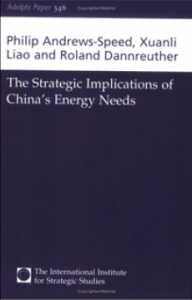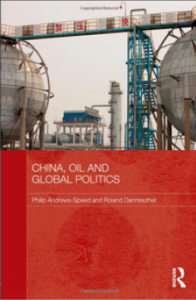Andrews-Speed, P and Waelde, T.W. (1996)
Transnational Corporations, 5 (3) 31-60.
Andrews-Speed, P and Waelde, T.W. (1996)
Transnational Corporations, 5 (3) 31-60.
Andrews-Speed, P. and Gao, Z. (1996)
Journal of Energy and Natural Resources Law 14, pp.161-178.
 China is frequently described as a threat to regional and global stability and its rapidly rising demand for imported energy is seen as one cause of this threat. This book shows that domestic politics and foreign policy have both played a part in China's recent major energy … Continue Reading ››
China is frequently described as a threat to regional and global stability and its rapidly rising demand for imported energy is seen as one cause of this threat. This book shows that domestic politics and foreign policy have both played a part in China's recent major energy … Continue Reading ››  China’s rapid economic growth has led to a huge increase in its domestic energy needs. This book provides a critical overview of how China’s growing need for oil imports is shaping its international economic and diplomatic strategy and how this affects global political relations and behaviour.
Part One … Continue Reading ››
China’s rapid economic growth has led to a huge increase in its domestic energy needs. This book provides a critical overview of how China’s growing need for oil imports is shaping its international economic and diplomatic strategy and how this affects global political relations and behaviour.
Part One … Continue Reading ›› The state of energy relations between China and Russia is exemplified by the recent dispute over the price of oil delivered through the EPSO pipeline and by the continued failure to reach agreement over a gas proce.
“China, Oil and Global Politics”
Philip gave a talk on the new book to an audience at the EIAS. The seminar was chaired by Dick Gupwell, the Vice-Chairman of EIAS, the discussants were Alexandra Sombsthay, International Relations Officer at the Directorate-General for Energy of the European Commission, and Theresa Fallon, Senior Associate of the EIAS.
“China, Oil and Global Politics”
Philip gave a talk on the new book to an audience of about 40 at ESI. The seminar was chaired by Elspeth Thomson, Senior Fellow at ESI, and attended by staff and students from the University as well as professionals from the private and public sectors.
Discussion was directed at understanding the … Continue Reading ››
China faces possibly the worst electricity shortages in decades. These result, in part, from long-standing inconsistencies in its energy pricing policies.